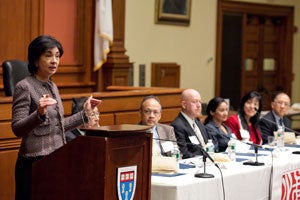Massachusetts Supreme Judicial Court appointee Fernande R.V. Duffly ’78 recalled her Harvard Law School admissions interviewer asking if she sought special treatment as a minority applicant.
Duffly, who became the first Asian Pacific American to serve on the Supreme Judicial Court when she was appointed by Massachusetts Governor Deval Patrick ’82 in December, assured him she did not.
“I hadn’t thought of myself as an activist but knew I wanted to go to law school to acquire the wonderful tools that were so powerful, that could effect social change,” Duffly said in her opening remarks at a panel featuring Asian Pacific American judges in the state on March 31, 2011. “That’s why I came here [to Harvard].”
Duffly was joined by six other Asian American judges at an event hosted by the Harvard Asian Pacific American Law Students Association [pictured above with Duffly, L-R]: Richard J. Chin and John T. Lu of the Superior Court, George F. Phelan of the Norfolk Probate and Family Court, Sabita Singh of the District Circuit Court, Eleanor C. Sinnott of the Boston Municipal Court, and Paul M. Yee of the Quincy District Court.
Born in Indonesia to Dutch and Chinese parents, Duffly credits her commitment to public service to her experiences growing up in the United States as part of an immigrant family.
“My sense of obligation came from how many people helped our family—we had no money,” she said. “That sense of obligation didn’t translate into being a lawyer until I was in college in the sixties when I worked for legal services.”
Duffly had previously served on the Appeals Court since 2000 and was appointed to the Probate and Family Court in 1992. After graduating from the University of Connecticut in 1973 and Harvard Law School in 1978, she joined the litigation department of the Boston law firm K&L Gates, then known as Warner and Stackpole.
During the discussion moderated by Harvard Law School assistant professor Mark Wu, the judges shared their experiences fighting cultural stereotypes and community pressures in pursuing their trailblazing career paths.
Chin, the first Asian American to be appointed to the state’s judiciary, recalled facing discrimination growing up in Brockton as one of the few Chinese students. Chin said he did not understand the significance of his appointment until he was sworn in at the Josiah Quincy Elementary School in Chinatown with a room full of relatives, family friends, and people from the Chinese community who, like his parents, were immigrants.
“It struck me when I looked out and saw my parents and many people with tears in their eyes,” Chin said. “I was there because of the efforts of people like my parents and others who were in that room who came to this country, and I think that seeing someone being sworn in by the governor as a judge really meant a lot to them because of what they went through.”
Others, such as Yee, appointed to the Quincy District Court in 2009, and Lu, who has served on the Superior Court since 2006, discussed the pressures they faced from their first-generation immigrant parents, who pushed them to pursue a career in medicine or pharmacy.
Citing the “dismal numbers” of minorities and women in management positions in law, Duffly urged students in the audience to fight for opportunities for their generation.
“Every small step towards making a difference is important,” Duffly said. “If you don’t do it, you’re not going to survive in law.”
